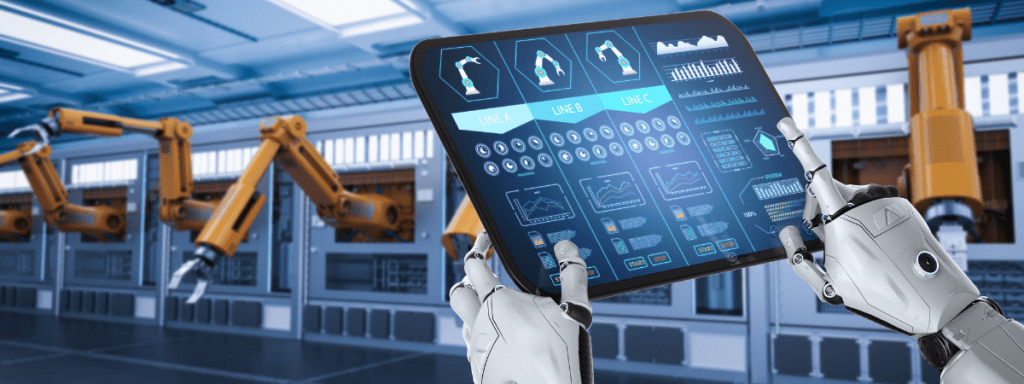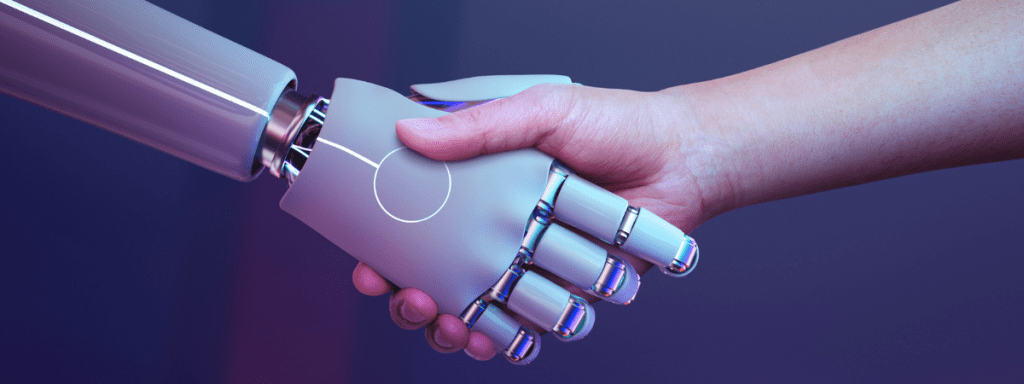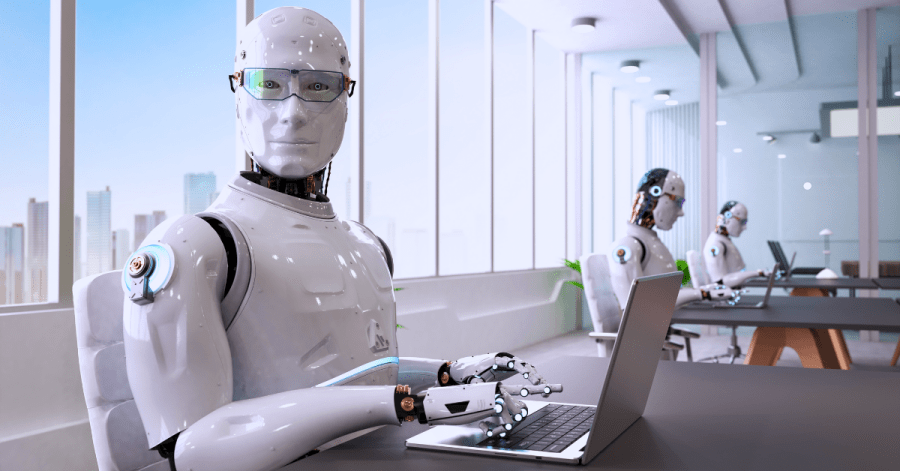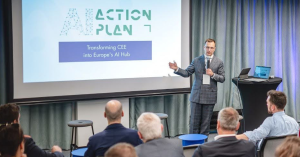How AI will impact the future of work has become a topic of global interest. The latest reports are projecting that the AI market is set to experience explosive growth, with a staggering jump from nearly $100 billion in 2021 to an estimated $2 trillion by 2030. Moreover, becoming one of the fastest-growing technologies, AI is predicted to have a $15.7 trillion potential contribution to the global economy by the end of the decade.
AI has already started to transform the workforce landscape, and in this article, The Recursive will explore how humans can take advantage of the escalating innovation wave.
When considering how AI will impact the future of work, it is essential to examine the different areas of the technology, including machine learning, natural language processing, and advanced language models. While these technologies are poised to enhance and streamline our work processes, it is equally important to acknowledge the continued significance of human intelligence in the modern workforce.
AI and the future of work
The World Economic Forum (WEF) recently published a report that predicted the growth of AI in the labor market and identified tasks that are more likely to be automated in the future. These tasks include, for example, data collection and performing simple, repetitive assignments. However, tasks that require abstract thinking, problem-solving, and human touch will likely remain the domain of human beings for the foreseeable future.
In extreme scenarios, some science fiction novels and movies have painted a picture of a world where AI has taken over humans’ jobs entirely, leaving many people unemployed. While AI can change the future of work, it is still one component of a larger workforce.
As we continue to navigate the societal challenges of AI and the labor market, it is essential to remember that AI is not a replacement for human beings. Instead, it is a tool that can help us perform tasks once thought impossible with the right skills and willingness. Considering the challenges of climate change and other societal issues we continue to face, we can use the technology to create a better future for ourselves and the planet.
To dive deeper into the effects of AI on the way humans work, we have sat down with CEE AI startup founders, analyzing some of the main impacted areas. The insights were provided by:
- Filip Dvořák: CEO and founder of Czech automation platform Filuta AI
- Dominik Mate Kovacs: CEO and founder of Hungarian text-to-video solution Colossyan
- Milan Mahovský: CEO and founder of Czech AI-powered hiring platform dream.jobs
- Adam Gonczarek: CTO and co-founder of Polish automate document processing platform Alphamoon
AI will help us understand human bias in recruitment and speed up the process.

Humans naturally bring bias to recruiting, whether intentionally or not. And as humans provide data sets to AI, the bias can be transferred. Therefore, AI needs to be programmed correctly. In such cases, AI can help to understand and promote no-bias recruitment in two key views, as Milan Mahovský, the CEO and founder of dream.jobs, explains.
“First is intentional bias, for example, when a hiring manager requires to hire a man or a good-looking employee. The second is not intentional. People discriminate subconsciously without realizing it. We focus on understanding skills matching, how many years of experience the person has, or if they have managerial experience. AI does not take into consideration such bias factors if the training of AI is programmed not to include copying or simulating human behavior.”
“Another view on non-bias is that current job portals or career pages ask the candidates to choose a category of job adverts. Very often the job is in a different category, and they do not find it. AI allows search based on CV; the categories (boxes) are not needed. So the candidate can find all relevant jobs,” adds Milan Mahovský.
Milan Mahovský further comments on recruitment efficiency, “AI has huge potential to speed up recruitment. It can match a CV with a job advert 24/7 daily with better accuracy than full-text and categorizations. Moreover, AI-powered job alerts notice candidates about relevant jobs. Nowadays, recruitment, on average, takes 41 days. For many types of positions, it takes a few months. AI has the power to shorten the time to hire by 50 to 80%.”
AI automation will save us time to focus on other tasks and boost work efficiency.

By taking on repetitive and mundane tasks, AI allows people to focus on more complex and high-value tasks that require human skills, such as creativity, critical thinking, and problem-solving. With AI taking care of routine tasks, we can streamline processes, reduce errors, and improve productivity.
For example, in the medical industry, AI advances data analysis or streamlines administrative tasks, allowing doctors and nurses more time to solve complex medical problems. In another case, AI advances in machine learning skills and computing power have enabled the development of autonomous vehicles, such as autonomous cars, boosting transportation and mobility industries.
Filip Dvořák, the CEO and founder of Filuta AI, notes, “one of the most substantial areas of applying AI in companies is intelligent automation – replacing manual processes in the company with automated optimization systems that not only automate but also optimize operations. Intelligent automation is growing into an enormous $1T in 2026, and it is also the primary market of Filuta AI. Many other areas will benefit from AI, such as customer experience personalization, predictive maintenance, or career management.”
“AI assists and simplifies mundane tasks. By releasing people from repetitive tasks that create little value, AI companies help their clients tap into the new potential of their existing teams. We have insights from our clients at Alphamoon who say document AI software increased team morale (work became more interesting and easier) and gave them time to tackle more challenging issues. Automation helps find information faster and lets our clients focus on building a better experience,” says Adam Gonczarek, the CTO and co-founder of Alphamoon.
“AI will be the force shaping many industries in a matter of months, not years. Bringing AI to internal processes will likely mean staying ahead of the curve, which might be the most crucial benefit of all,” adds Adam Gonczarek.
Competition vs. cooperation: Why human-AI collaboration will dominate the future of work.

While AI promotes more efficient workflow, human workers can provide the context and intuition that AI may lack. As a result, the cooperation between AI technology and human thinking can bring better decision-making and more innovative solutions to complex problems. Moreover, humans can adapt to changing situations and act based on ethical considerations.
“AI is already the right-hand tool for people working in various areas such as engineering, design, finance, or art. For example, writer’s block is a common problem in writing, and AI is already helping authors have a base foundation for their work. Humans are primarily exceptional at making high-level decisions and solving complex problems. The current AI system won’t be able to replace this critical thinking, at least as long as they are designed restrictedly,” says Dominik Mate Kovacs, the CEO and founder of Colossyan.
AI will create brand-new jobs.

According to recent findings, the current speed of AI development will affect hundreds of millions of jobs worldwide. While the impact is likely going to result in job losses, the long-term effects forecast positive growth of the global economy. Similar to previous technological advancements like the Industrial Revolution, AI will also ultimately lead to the adaptation of current jobs and the creation of new ones.
Despite fears that AI will replace human workers, the reality is that AI systems are being designed to augment human labor rather than replace it entirely. In fact, the job market is expected to see significant job growth in AI, with over half of all jobs created in the commercial world expected to require AI skills in the future.
“AI is not only bringing enormous value in operational savings and revenue improvements, but it also creates jobs in three categories. First, there are going to be jobs related to the applications of AI itself – trainers, explainers, auditors, ethics, and risk managers. New jobs are going to form around AI-augmented-human positions, artists, designers, healthcare professionals, and educators. And finally, AI researchers and engineers will drive forward the capabilities of AI itself to help across all the fields,” Filip Dvořák adds.







